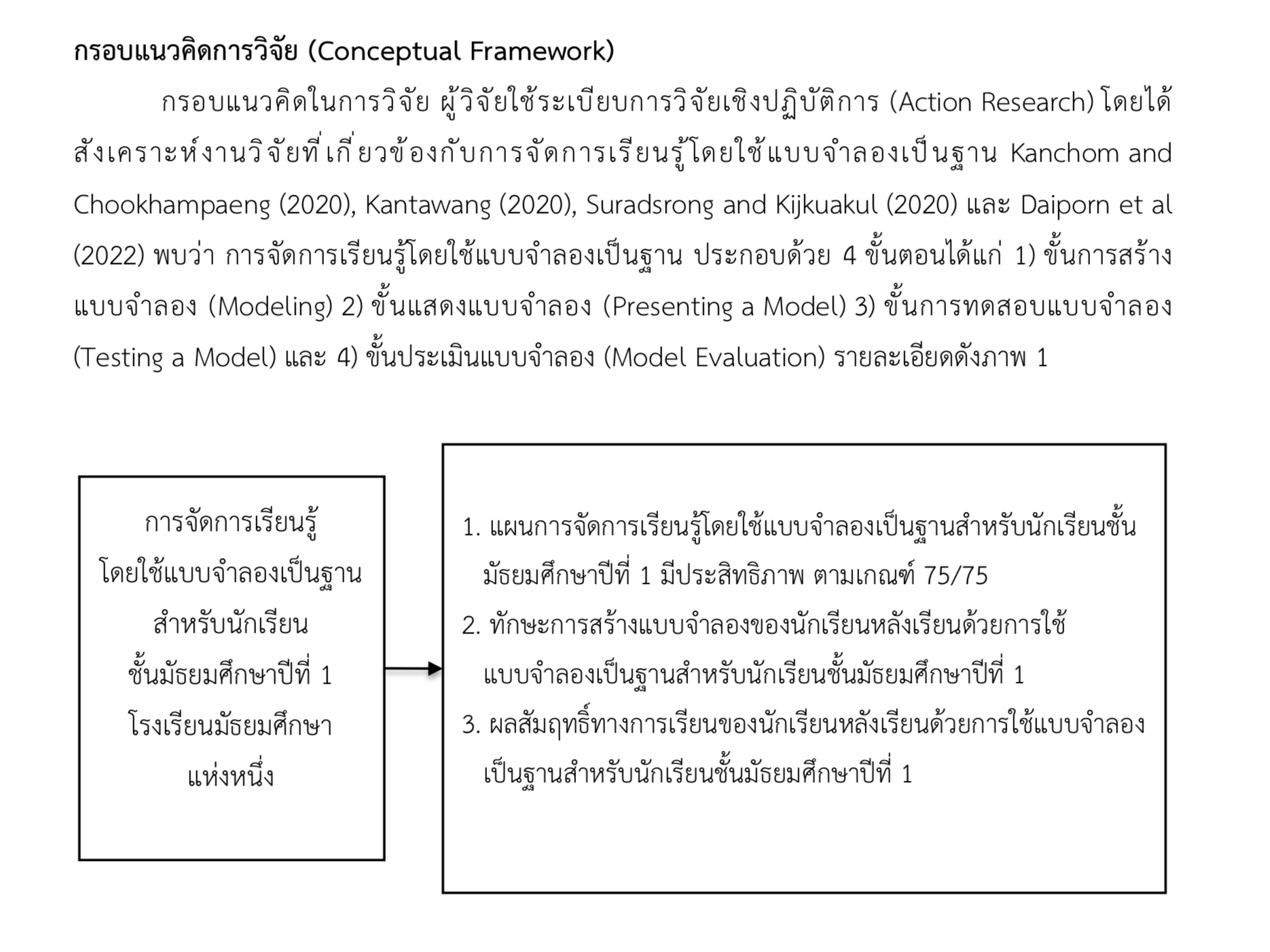การพัฒนาทักษะการสร้างแบบจำลองด้วยการจัดการเรียนรู้โดยใช้แบบจำลองเป็นฐาน สำหรับนักเรียนชั้นมัธยมศึกษาปีที่ 1
Main Article Content
บทคัดย่อ
งานวิจัยนี้มีวัตถุประสงค์เพื่อ 1) พัฒนาและตรวจประสิทธิภาพของแผนการจัดการเรียนรู้โดยใช้แบบจำลองเป็นฐานสำหรับนักเรียนชั้นมัธยมศึกษาปีที่ 1 ตามเกณฑ์ 75/75 2) เปรียบเทียบทักษะการสร้างแบบจำลองหลังการจัดการเรียนรู้โดยใช้แบบจำลองเป็นฐานฯ กับเกณฑ์ร้อยละ 70 และ 3) เปรียบเทียบผลสัมฤทธิ์ทางการเรียนรู้ก่อนและหลังการจัดการเรียนรู้โดยใช้แบบจำลองเป็นฐานฯ โดยมีกลุ่มตัวอย่างเป็นนักเรียนชั้นมัธยมศึกษาปีที่ 1 จำนวน 1 ห้องเรียน โรงเรียนแห่งหนึ่ง สังกัดสำนักงานเขตพื้นที่การศึกษามัธยมศึกษาพิจิตร จำนวน 36 คน ได้จากการสุ่มแบบกลุ่ม เครื่องมือที่ใช้ในการวิจัย ได้แก่ 1) แผนการจัดการเรียนรู้โดยใช้แบบจำลองเป็นฐานฯ ผลประเมินความเหมาะสมอยู่ในระดับเหมาะสมมากที่สุด 2) แบบประเมินทักษะการสร้างแบบจำลองเป็นฐาน เป็นแบบสังเกตพฤติกรรม 4 ระดับ จำนวน 5 ข้อ และ 3) แบบทดสอบวัดผลสัมฤทธิ์ทางการเรียนรู้โดยใช้แบบจำลองเป็นฐานฯ เป็นข้อสอบปรนัย จำนวน 20 ข้อ มีค่าดัชนีความสอดคล้องของข้อคำถามกับวัตถุประสงค์การเรียนรู้ ระหว่าง 0.67 – 1.00 สถิติที่ใช้ในการวิเคราะห์ข้อมูล ได้แก่ ค่าเฉลี่ย ส่วนเบี่ยงเบนมาตรฐาน ร้อยละ และ t-test ผลการวิจัยพบว่า 1) ประสิทธิภาพแผนการจัดการเรียนรู้โดยใช้แบบจำลองเป็นฐานฯ สูงกว่าเกณฑ์ 75/75 2) ทักษะการสร้างแบบจำลองหลังการจัดการเรียนรู้โดยใช้แบบจำลองเป็นฐานฯ สูงกว่าเกณฑ์ ร้อยละ 70 อย่างมีนัยสำคัญทางสถิติที่ระดับ .05 และ 3) ผลสัมฤทธิ์ทางการเรียนรู้ฯ หลังเรียน สูงกว่าก่อนเรียน อย่างมีนัยสำคัญทางสถิติที่ระดับ .05
Downloads
Article Details

อนุญาตภายใต้เงื่อนไข Creative Commons Attribution-NonCommercial-NoDerivatives 4.0 International License.
The authors are solely accountable for the ideas and recommendations articulated in the articles published in The LEAD Journal RU. Should there be any inaccuracies, the authors accept full responsibility for such errors.
Moreover, the Editorial Board, Editorial Team, and Committee of The LEAD Journal RU are committed to maintaining the integrity of the principles reflected in the authors' contributions.
Consequently, Ramkhamhaeng University, the Editorial Board, Editorial Team, and Editors shall not be held liable for any outcomes arising from the authors' presentation of their ideas and recommendations within The LEAD Journal RU.
เอกสารอ้างอิง
Buckley, B. C., Gobert, J. D., … and Willett, J. (2004). Model-Based Teaching and Learning with BioLogical TM: What Do They Learn? How Do They Learn? How Do We Know?. Journal of Science Education and Technology. 13(1), 23-41.
Daiporn, D, Channok, C, … and Chokchaloemwong, D. (2022). A Study on the Effects of Model-based Inquiry Pedagogy on 21st Learning and Innovation Skills of the Students Grade 3 in a Virtual Science Classroom. Journal of Education, Mahasarakham University, 16(4), 35–46. [In Thai].
Jangchawai, K., Wichaidit, S. and Angnakoon, P. (2023). A Study of Stop-motion Modeling that Affects Achievement and Modeling Skill of Nerve Impulse for Matthayomsuksa Sixth Students. Sukhothai Thammathirat Open University Journal, 36(1), 54-71. [In Thai].
Kawpa, J. T. (2024). The Importance of Science. Retrieved from https://www.gotoknow.org/posts/306599. [In Thai].
Haewthaisong, J. (2013). The Development of Science Learning Management Plan Using Project-Based Learning on the Topic of Forces in Daily Life for Grade 8 (Research Report, Mahasarakham University). [In Thai].
Kanchom, R. and Chookhampaeng, S. (2020). Development of the Scientific Concept of Reproduction of Flowering Plants and Growth, using 7E Inquiry-based Learning with Gallery Walk Technique for Grade 11 Students. Journal of Educational Measurement, Mahasarakham University, 26(1), 186-197. [In Thai].
Kantawang, J. (2020). Model-based Learning Approaches in Biology to Promote Learning Achievement and Scientific Reasoning of Tenth Grade Students. (Master Thesis, Burapha University). [In Thai].
Kongkham, P. and Jansawang, N. (2023). Analytical Thinking and Academic Achievement in Biology on Chromosomes and Genetic Material of Mathayomsuksa 4 students Receiving Cooperative Learning Management in STAD Format Together with Concept Map. Interdisciplinary Academic and Research Journal, 3(5), 497-510. [In Thai].
Kongton, T., Sukumek, B. and Faiyakamta, C. (2016). The Development of Organic Chemistry Concepts in Grade 11 Students Using Model-Based Learning. Journal of Science, Technology and Environment Research Unit, 7(1), 62-76. [In Thai].
Maison, M., Darmaji, D., … and Indrawati, P. S. (2019). Science Process Skills and Motivation. Humanities and Social Sciences Reviews, 7(5), 48–56.
Ministry of Education. (2017). Indicators and Core Curriculum Science Learning Group (Revision 2017) According to the Basic Education Core Curriculum, B.E. 2008, Office of the Committee Basic Education, Ministry of Education. Bangkok: Association of Agricultural Cooperatives Thailand. [In Thai].
Office of Academic and Educational Standards. (2017). Learning Standards and Indicators for Mathematics, Science, and Geography Learning Groups in the Learning Subject Group Social Studies, Religion and Culture (Revised Edition 2017) According to the Basic Education Core Curriculum, B.E. 2008. Bangkok: Office of Academic and Educational Standards, Office of the Basic Education Commission, Ministry of Education.
Parinthong, W. and Nuangchalerm, P. (2020). Developing of Modeling Skills on Entitle Acids-Base for Year 11 Students Using Model-based Learning Activities. Journal of Education Rajabhat Maha Sarakham University, 17(3), 89-100. [In Thai].
Piaget, J. (1970). Piaget’s Theory (G. Gellerier & J. Langer, Trans.). In: P.H. Mussen (Ed.), Carmichael’s Manual of Child Psychology (3rd Ed, Vol.1). New York: Wiley.
Promwong, C. (2013). Testing the Effectiveness of Media or Teaching Materials. Silpakorn Educational Research Journal, 5(1), 7-20. [In Thai].
Sodok, P. and Phorntaweeku, S. (2023). Developing the Ability to Solve Problems in Biology of Secondary 4 Students with the Problem-based Learning Management Model. Journal of Research and Development Institute, Rajabhat Maha Sarakham University. 10(1), 437-452. [In Thai].
Suradsrong, K. and Kijkuakul, S. (2020). Model-based Learning Approach Integrated with Augmented Reality for Enhancing Grade 10 Students’ Model-building Skills and Scientific Conceptions in Solution Topic. Journal of Education and Innovation Naresuan University, 23(4), 46–57. [In Thai].
Thanjai, N., Suttiwan, W., and Pinthong, T. (2021). Using the Scientific Models to Promote Analytical Thinking Ability and Learning Achievement of the Solar System of Grade 9th Students. Journal of Humanities and Social Science Valaya Alongkorn, 16(1), 31–47.


